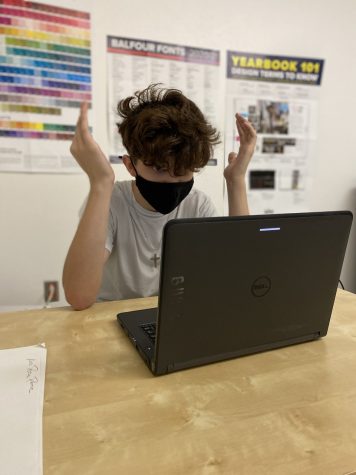Mica Mines Unsafe for Children Workers
May 3, 2021
Mica, a thin, flaky, silicate mineral that is used in paints, electrical insulators, toothpaste, and cosmetics to make them shine. Adults use it, but children dig it up.
According to research done by the ethicalunicorn.com, India makes up around 60 percent of the mica industry. The eastern Indian states, Jharkhand and Bihar, make around 25 percent of that 60. Both of those states are below the poverty line, making them targets for the mica industry.
“I would buy something shimmery because it’s pretty and trendy,” said Maria Diaz. “But I admit, I don’t know where the shimmer came from.”
Madagascar is another large producer of mica. Both India and Madagascar have extreme poverty, unclean water, and poor access to health care and schooling. Because of these conditions, many families are willing to do just about anything to keep food and water on the table. So they send their children to work in the mica mines to help put food on the table.
The majority of those working in the mica mines are children. The legal age to work in these mines is the same as the U.S., but children younger than 14 can be seen in the mines.
The jobs in mines can be very dangerous. Sometimes those working in the mines are injured or they die. Other risks of working in the mines are bites from insects, skin infections, respiratory diseases, and mine collapses. More than two children die every month in the mines, usually from the health issues.
“It is not safe, but it is the life they know. I noticed in the video some of them are there with an adult, maybe that’s a parent,” said Diaz.
Most of the anti-slave and child labor organizations state that the children working isn’t the problem, they need the money. The problem is the unsafe standards and unfair pay. That’s what needs to be fixed.
“I don’t think they get paid enough, but that might be the only income source for them, so they may not want to stop mining,” said Diaz.
The industry does not fairly pay the children or adults that work in the mine. Mica is sold at high prices, despite how common it is. The children, however, don’t even get paid a dollar at the end of the day. But parents can’t just stop sending their children to work because they need the money for food and water.
“Companies should try harder to stop exploiting the children. There shouldn’t be any excuse as to why they can’t stop buying mica linked to child labor,“ said Diaz.
Most cosmetic lines add mica to their product to create a pretty, shiny look. But several cosmetic brands continue to buy mica from mines that use child labor and exploit their employees. According to ethicalunicorn.com, the large makeup lines that buy mica from unethical mines are MAC, Estee Lauder, Bobbi Brown, and L’oreal Paris. These brands are some of the largest in the industry, making their demand for mica go up to satisfy their customers.
According to ethicalunicorn.com, some brands are trying not to use unethical mica. For example, Beautycounter who began their own domestic mica mine in Hartwell, Georgia and Lush Cosmetics who switched to synthetic mica, after they couldn’t guarantee whether their suppliers were linked to the unethical mines. Although it is good a few companies are beginning to become more aware and help, but how can people who aren’t in the industry help?
“I think using child labor to produce mica should stop and people should encourage brands that do use child labor to stop,” said Nadia Diaz.
A great place to start is to spread awareness, tell people about what’s going on. The next largest thing we can do is to listen to the people and children who work in the mines, donating is a great way to help too. If there are petitions they are likely to be in the Indian government meaning do not sign them, it is illegal and the petition can be denied because of it. Boycotting is also not recommended because this will result in the families not getting paid anymore.
People will walk into Sephora or Ulta everyday without realizing where the beautiful sparkly blue in their pallet comes from, more people need to be aware of what they are buying and attempt to help.
